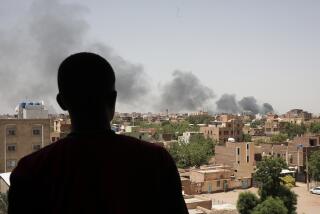NEWS ANALYSIS : Marines Restore Calm to Baidoa, but Will It Last?
- Share via
BAIDOA, Somalia — Just under a month ago, the road into Baidoa was littered with cadavers, hunger victims who had failed to make it to the haven of relief agency feeding centers, which themselves were badly understocked. The bush country around runways of the airport also contained pieces of bodies, leftovers from exploded mines and gunshots.
The center of the city was largely empty, its residents afraid to venture into a terrain ruled by young men on sometimes gaudy, junky war wagons mounted with machine guns and recoilless rifles.
But almost everything has changed in Baidoa in the month or so that U.S. troops have taken control here and put the civil war in abeyance.
Food convoys guarded by troops arrive unmolested. Bags of grain are shipped on, again under guard, to villages that once were unreachable because of the danger from marauding gunmen. Starvation deaths are down markedly at the feeding centers run by aid groups, and rare are the gunshot-wound victims in hospitals.
Markets for charcoal, mangoes and other scarcities now run openly at the central intersection of the town near a big mosque and a crowded open-air teahouse.
Baidoa is the model city of the U.S. effort to restore limited order to Somalia and to safeguard food deliveries to the famine-stricken. It is here where efforts to set up some semblance of local government are most advanced, here where U.S. officials direct the attention of doubters disconcerted by the continuing armed clashes in Mogadishu and the uncertainty persisting in some rural areas.
Looking back, there is general agreement that Baidoa has been saved. “It’s an incredible difference,” said Jane Exner, a nurse at a hospital run by the International Medical Corps, which is partly funded by the U.S. government. “The food problem at least has been overcome.”
Issa Ali, a charcoal salesman in the main plaza, was equally upbeat. “We could not sleep in this town, and being awake was terrible too,” he told a visiting reporter.
Looking forward, however, worry is deep about maintaining Baidoa’s relative calm. “Right now, the convoys run well. There is control, but the chances of falling back are always there. We’re waiting,” said Mark Mullen, a worker for Concern, a relief organization.
Issa Ali declared his fear by warning about the return of “Yusef,” or Joseph, the nickname Somalis give to the sound of bullets passing by one’s ear. “Yusef is never far away,” he said as he flicked flies off his knee with a camel-hair whisk.
It is a measure of Operation Restore Hope’s initial success that its beneficiaries worry about how much there is to lose. In Mogadishu, the progress is gauged in tonnage of supplies that have passed through the port: 30,000 tons since Dec. 13. In Baidoa, it is counted by the ounce: the growth of babies who once were but lumps of bones.
Distress about the future derives from the continued existence of armed clan militias and roving gangs who brought on famine in Somalia through their insistent looting and disruption of farming in the country’s two fertile valleys.
The gunmen have been driven from Baidoa and other cities and are partially immobilized in Mogadishu under a U.S.-brokered agreement among top clan militia leaders. But no one is confident that given a chance the gunmen would not return--massively--to their warring ways.
“The victims of the civil war are tired, but it is not so clear that the perpetrators are,” relief worker Mullen said.
U.S. military officers stationed in Baidoa admit to the presence of “gangsters and bandits” in the countryside around the city. “They keep a low profile. They know they’re not wanted,” one officer said. “But unfortunately, they are there.”
The officer proudly displayed weapons seized in the early days of the U.S. landing, including nine gun-mounted, custom-outfitted vehicles called “technicals.” Graffiti scrawled on one technical gave this unwelcome appraisal of its use: “We must kill and loot. Nobody will survive when we attack.”
U.S. military and civilian officials have tried to devise ways to ensure that guns do not return to the streets. By common admission, there is no all-inclusive solution. Instead, there is a mixed bag of short-term and theoretical, long-term prescriptions.
First and foremost is the powerful presence of neutral foreign troops--now largely American, later to be a mix of nationalities under the U.N. flag. The soldiers protect food convoys and try to keep order in cities while local leadership emerges, free of the intimidating clan militias; later the local leaders are supposed to work out political problems.
In Baidoa, two councils have been formed: a relief council to work with aid agencies to direct food to the needy in the city and outside; there is a security council to cooperate with foreign soldiers to finger troublemakers and pinpoint the whereabouts of illegal heavy weapons.
The councils have been described as “points of contact” to work with foreigners--and as the seeds of future, local government in a new, federated Somalia.
Their creation has led to some political squabbling. Traditional clan elders want to be involved to protect the interests of their extended families. Leaders of ousted militias want to maintain their influence.
Many of the participants have blood on their hands. But U.S. officials prefer to maintain an inclusive policy. So far, only followers of former dictator Mohamed Siad Barre, whose flight last year created a total vacuum in national power, have been barred.
In Baidoa, Siad Barre’s former provincial governor returned to the city to demand a seat on the local security council; U.S. military officials rejected him.
For the long term, a combination of continued foreign vigilance, functioning of local government and social pressure from war-weary Somalis is meant to wither the appeal of the idled militias. Nationally, talks have begun among 14 Somali political factions with the aim of restoring central government.
Many Somalis have come to believe that only the United States can effectively keep Somalia calm. But the Americans are eager to phase out their dominant involvement and turn duties over to a U.N.-led force.
U.S. special envoy Robert B. Oakley, who has been in charge of implementing the limited pacification program in Somalia, dismissed concerns that the “follow-on” U.N. force, which has yet to be formed, will be ineffective. It all but requires shedding the United Nations’ customary aversion to shows of force and use of fire.
“The United States came in here with a different philosophy from United Nations peacekeeping,” Oakley said in Mogadishu on Monday. “Ours is to come in with enough force to meet the maximum threat. The U.N. prefers fewer forces and light arms to show it is a friend. Sometimes armed elements see this as weakness.”
Last spring, the United Nations dispatched a 350-troop unit from Pakistan to Somalia. The Pakistanis largely holed up at Mogadishu Airport while looting and violence continued.
This time it will be different, Oakley predicted. Many countries will take part “assuming the command structure and rule of engagement remain unchanged.”
That means a centralized command for the various armies and the ability to shoot in self-defense or during weapons seizures, as the Marines do now under their “rules of engagement.”
“We have to avoid impossible political restrictions,” Oakley said.
He also said the United States would take some steps to make Somalia safer for the United Nations by confiscating heavy weapons not voluntarily impounded by the militias. But there will be no attempt at a general disarmament, which, Oakley said, “is well past the capability of the United States. . . . Our focus is going to be on heavy weapons . . . to try to discourage combat afterwards.”
For the time being, the widespread use of small arms places a heavy obstacle to a rapid return to normalcy. In Baidoa, 100 teachers have been recruited to open six schools for the first time in two years. But each time chairs are placed in the buildings, they are looted at night by gunmen, relief officials say.
Many Somalis are clamoring for a police force. But the Americans are reluctant to arm police who have come out of forced retirement. The Americans fear they might create yet a new, armed militia.
More to Read
Sign up for Essential California
The most important California stories and recommendations in your inbox every morning.
You may occasionally receive promotional content from the Los Angeles Times.













